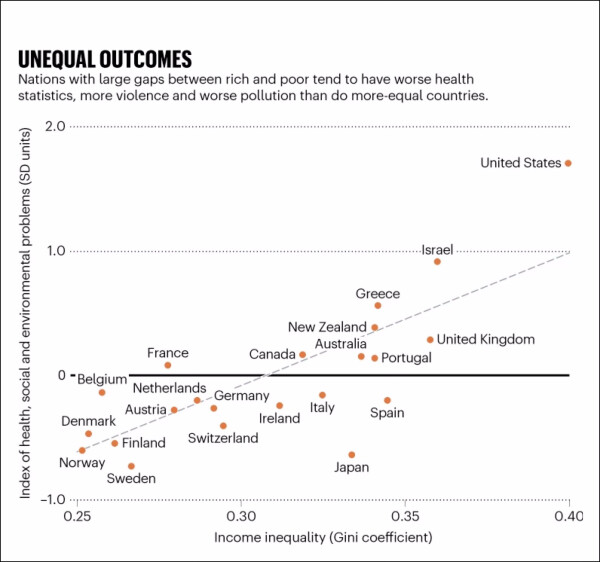A thought-provoking article published in Nature asserts that: "Equality is essential for sustainability. The science is clear — people in more-equal societies are more trusting and more likely to protect the environment than are those in unequal, consumer-driven ones."
Here is a short excerpt...
_________________________
As environmental, social and humanitarian crises escalate, the world can no longer afford two things: first, the costs of economic inequality; and second, the rich.
Between 2020 and 2022, the world’s most affluent 1% of people captured nearly twice as much of the new global wealth created as did the other 99% of individuals put together, and in 2019 they emitted as much carbon dioxide as the poorest two-thirds of humanity.
Evidence gathered by social epidemiologists, including us, shows that large differences in income are a powerful social stressor that is increasingly rendering societies dysfunctional. For example, bigger gaps between rich and poor are accompanied by higher rates of homicide and imprisonment. They also correspond to more infant mortality, obesity, drug abuse and COVID-19 deaths, as well as higher rates of teenage pregnancy and lower levels of child well-being, social mobility, and public trust. The homicide rate in the United States — the most unequal Western democracy — is more than 11 times that in Norway. Imprisonment rates are ten times as high, and infant mortality and obesity rates twice as high.
Many commentators have drawn attention to the environmental need to limit economic growth and instead prioritize sustainability and well-being. We argue that tackling inequality is the foremost task of that transformation. Greater equality will reduce unhealthy and excess consumption, and will increase the solidarity and cohesion that are needed to make societies more adaptable in the face of climate and other emergencies.
_________________________
FULL ARTICLE -- https://www.nature.com/articles/d41586-024-00723-3
#Economics #Inequality #Science #Environment #Climate #ClimateChange #ClimateCrisis
